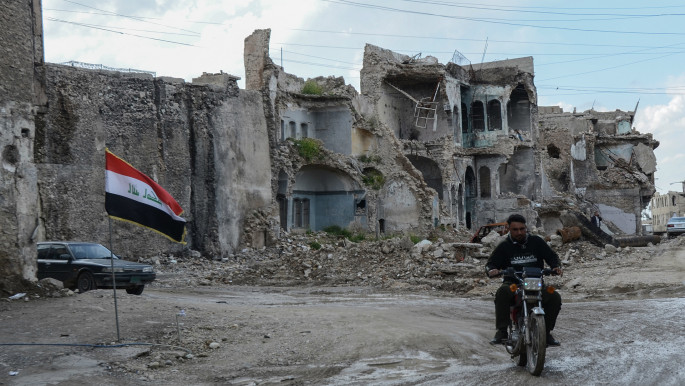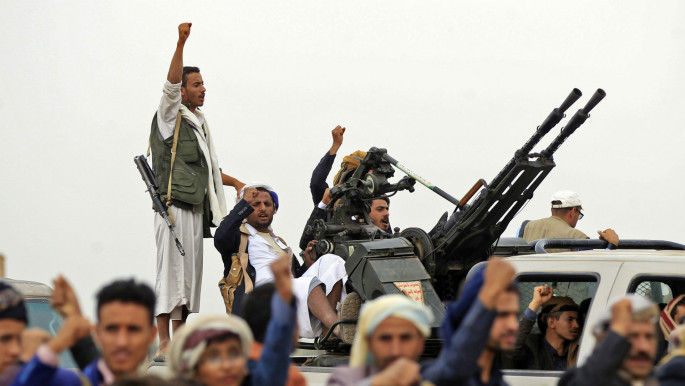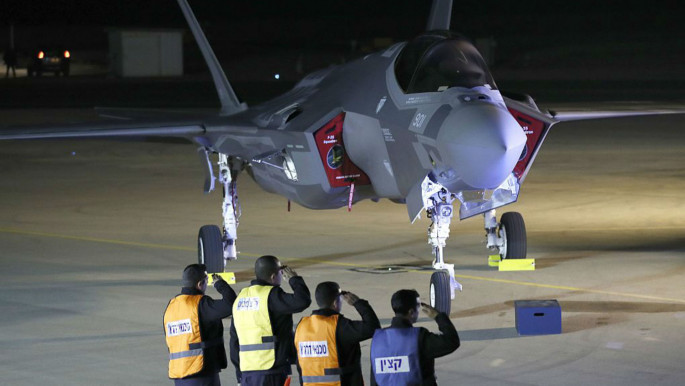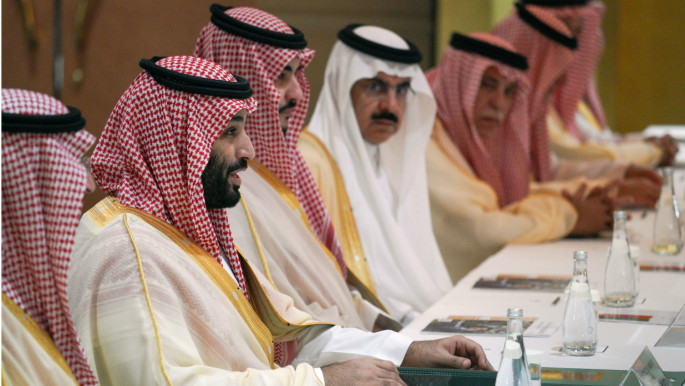Normalisation breeds impunity: Deafening silence as Israel strikes multiple Arab states
In recent months, Israel has ventured beyond its usual battlefields, conducting multiple airstrikes in neighbouring Syria, Lebanon and even Iraq, with reports suggesting Tel Aviv was even eyeing up potential attacks on the Houthi rebels in Yemen, which it believes is being supplied arms by its arch rival Iran.
While Israel has repeatedly bombed Iranian targets in neighbouring Syria for years, an expansion of its campaign to Iraq – where Israel struck the Osirak nuclear reactor in 1981 – would risk damaging Washington's relations with Baghdad and if untamed, would open up a whole new world of opportunities for Tel Aviv.
A series of blasts in Iraq over the past month at training camps and arms depots used by the Iranian-backed mainly-Shia Hashed al-Shaabi paramilitary forces have caused grave concern for many.
Since mid-July, five Hashed arms depots and training camps have been targeted in apparent attacks, and the group said it had also fired at surveillance drones over two other bases.
While the source of the strikes remained a mystery for several weeks, senior Middle Eastern intelligence official said Israel bombed a base north of Baghdad last month, while two American officials said the Jewish state carried out multiple strikes in Iraq in recent weeks, the Times reported.
Iraqi investigators however confirmed Israel was "certainly" behind several attacks on Hashed al-Shaabi bases, according to a parliamentarian and leading member of the paramilitary force, who said the government is preparing a complaint to the UN.
 |
|
| Read also: The Iraq Report: Suspected Israeli airstrikes worry Iraqi politicians |
The Hashed was established in 2014 from mostly-Shia armed groups and volunteers to fight the Islamic State group and is now formally part of Iraq's armed forces.
But the US and Israel fear some units are an extension of their arch-foe Iran and have been equipped with precision-guided missiles that could reach Israel.
"Are the attacks that happened surprising for the Iraqi government, the Hashed, or other factions? Of course not," Ahmad al-Assadi, a Hashed official and spokesman for its parliamentary bloc "Fatah" told reporters on Thursday.
"It's clear. The Hashed is being specifically targeted."
Though its ambitions have yet to allow it to dive into an already chaotic Yemen, Israel has reportedly been planning strikes against another Iranian-aligned group.
Yemen’s Houthi rebels have been at the receiving end of hundreds of Saudi-led coalition air raids for more than four years, but now Israel could add to the chaos.
Kuwaiti newspaper al-Jarida released a report earlier this month saying Israel is planning on striking sensitive positions on the Bab al-Mandeb strait linking the Red Sea and the Gulf of Aden.
The newspaper, which cited an anonymous informed source, said Israeli intelligence agency Mossad has been monitoring activities in the Yemeni strait, finding Iranian attempts to transport weapons to the Houthi rebels.
 |
|
| Read also: Yemen in Focus: Will Israel join the deadly conflict? |
The source added Tel Aviv shared information with Arab states, however it failed to elaborate or identify the nations involved.
Israel reportedly briefed the United States on the developments and provided information on Iran transporting weapons using the strait, according to al-Jarida.
The rebels, and Iran itself, have consistently denied claims it works as a proxy for the Islamic Republic, claiming full autonomy over its actions, which have recently seen an uptick in cross-border drone strikes targeting Saudi Arabia.
‘Calculated response’
But most recently in neighbouring Lebanon, Israel did a little more than plan.
Earlier this month, Tel Aviv launched a "drone attack" on a stronghold of the Lebanese Shia Hezbollah movement in Beirut, in a pre-dawn incident that came just hours after Israel said it had launched strikes in neighbouring Syria to prevent an Iranian attack on the Jewish state.
Two Hezbollah members were killed in the attack, prompting a reaction from Hezbollah chief Hassan Nasrallah who vowed a calculated response.
 |
|
|
Read also: Syria Weekly: Iran controls the |
In a televised speech broadcast to thousands of supporters, Nasrallah said the attack violated a UN Security Council resolution that ended the 33-day war between the two factions in 2006, which killed 1,200 people in Lebanon, mostly civilians, and 160 in Israel.
Nasrallah said Hezbollah would do "everything" to prevent similar attacks.
"The time when Israeli aircraft come and bombard parts of Lebanon is over," he said.
"I say to the Israeli army along the border, from tonight be ready and wait for us," he said. "What happened yesterday will not pass."
Addressing Israelis, he said: "Do not live, do not rest, do not be reassured, and do not bet for a single moment that Hezbollah will allow... aggression of this kind."
Earlier, the Lebanese army said two Israeli drones had violated Lebanese airspace over Beirut, and Hezbollah said one had damaged a media centre it runs in a residential building.
Prime Minister Saad Hariri, who is one of the Shia group's most prominent political opponents, said the incident was "a threat to regional stability".
US Secretary of State Mike Pompeo later on Sunday called Hariri to stress the "necessity to avoid any escalation", the premier's office said.
Meanwhile, Israeli military spokesman Jonathan Conricus said the Israeli attack in Aqraba, southeast of Damascus that preceded the Beirut strike, targeted "terror targets and military facilities belonging to the Quds force (of Iran's elite Revolutionary Guards) as well as Shia militias".
 |
Iran has no immunity anywhere.. Our forces operate in every sector against the Iranian aggression - Israeli PM, Benjamin Netanyahu |
 |
"We've been tracking the Quds force" for weeks, he said.
"The intention was to fly a number of attack drones towards targets located in northern Israel," he said.
Just hours later, Israeli Prime Minister Benjamin Netanyahu toured the north of Israel where he flexed his country’s muscle.
"Any country that allows its territory to be used for aggression against Israel will face the consequences," said the veteran premier, who has sought to burnish his security credentials ahead of September elections.
Just minutes after Israel announced its raid, Netanyahu in the morning had hailed what he termed a "major operational effort" in thwarting an attack.
"Iran has no immunity anywhere," Netanyahu said. "Our forces operate in every sector against the Iranian aggression."
While it does not share any formal diplomatic relations with much of the Arab world, bar Jordan and Egypt, Israel has developed increasingly close ties with Gulf nations, including Saudi Arabia and the UAE, over mutual concerns about Iran.
The warming of relations in recent years, as well as the weakening of traditionally mighty Arab armies, has allowed Israel to target Arab nations in the region with impunity.
"Israel finds itself free to do whatever it wants firstly because of the absence of the major Arab armies in the region, especially following the destruction or absence of Iraqi army, weakness of the Syrian army and the rest," Palestinian author and professor, Dr Nawaf Tamimi told The New Arab.
"But it is also benefiting off the weakness of Arab unity and the overall political climate in the region, which has in recent years included increasing normalisation with Israel, especially with regards to Saudi Arabia and the UAE," he added.
"Israel is taking the opportunity to do what it needs to do it in the region in what is quite obviously a proxy confrontation with Iran and all its allied militias in the region. Israel is unable to directly strike Iran so it is instead directly striking Iranian arms across the Middle East, especially in Lebanon, Syria and now Iraq.
Israel's occupation of Palestine is still widely seen as an obstacle to improving ties between the Jewish state and its Arab neighbours.
 |
Unfortunately, Israel will continue and even expand its military activities, so long as there is an absence of even condemnation from the Arab states and Arab League - Dr Nawaf Tamimi |
 |
Covert ties
But for the Saudi kingdom and its allies in the Gulf, Israel's shared enmity with Iran may trump the powerful and popular anger over an Arab state normalising ties with Israel.
For many years, formalising such an alliance would have rattled much of the Arab world, however recent undercover deals, secret visits and meetings, as well as lone publicity stunts could suggest authorities in the Gulf region could be preparing citizens of a slow change of attitude towards Israel.
Last year, Israel’s Netanyahu and Oman's Sultan Qaboos met in Muscat for the first historic meeting of its kind between leaders of the two countries since 1996.
 |
|
| Read also: Saudi-Israeli relations: The emergence of a new alliance |
In May of that year, Israel's ambassador to Egypt described Saudi Crown Prince Mohammed bin Salman (MbS) as a partner of Israel, further fuelling speculation that the powerful prince has been engaging in secret talks with Israel.
A year earlier, Bahrain’s foreign minister told his Israeli counterpart that the king of Bahrain wanted to normalise ties with Israel, according to a report by Israeli Channel 13 News. The channel also reported the former leader of Israel’s intelligence agency Mossad visited Saudi Arabia in secret in 2014 in an effort to rally support against Iranian influence.
Meanwhile, two Israeli ministers also travelled to the UAE in 2018.
But diplomacy is far from the only avenue being explored between Israel and the Gulf states.
An investigation revealed the United Arab Emirates has for the past decade been working on a multi-million dollar business deal to secure Israeli spy planes for intended use against Iran.
 |
The United Arab Emirates has for the past decade been working on a multi-million dollar business deal to secure Israeli spy planes for intended use against Iran |  |
It revealed the UAE has been working with Israeli businessman Matanya Kochavi, known as Mati, to process the three billion shekels ($846 million) worth of deals.
The revelation stems from the notorious 2017 "Paradise Papers" leak by the International Consortium of Investigative Journalists (ICIJ) and German newspaper Sueddeutsche Zeitung.
The Paradise Papers documents reveal that the deal involved the exact amount of money Mati has been dealing with the UAE, with evidence of a large proportion of the sum being paid in cash by Emirati leaders.
Publicity stunts
But on a more public level, calls for normalisation have slowly and bizarrely seeped through citizens of Israel and Gulf states, both of which publicly calling for formal relations in what is deemed to be a remarkably unusual shared sentiment between age-old foes.
Earlier this month, an Israeli journalist raised the Saudi flag in Jerusalem's Old City and called for official diplomatic relations with the kingdom.
Footage of the publicity stunt, which was shot outside the Hebron Gate in the northwestern part of Jerusalem's Old City, was posted on the Israeli foreign ministry's Arabic-language Twitter account.
"I really hope that there will be peace with Saudi Arabia, and I could come over to Saudi Arabia to visit, and the people from Saudi Arabia can come over to Israel and visit," Yanki Farber says.
"We are really looking for peace between the two countries," the writer for Orthodox news website B'hadrei Hadarim added.
The stunt came after a Saudi blogger visited Jerusalem, where residents targeted him with abuse and hurled chairs at him.
The Saudi visitor, named by Israeli public radio as Mohammed Saud, was one of six invitees from Arab states brought to Israel by its foreign ministry to give them "fresh viewpoints" of the country.
Although such visits have been held before, the attendance of Iraqi and Saudi nationals was a first.
Video posted online showed mainly young Palestinians spitting, cursing and throwing plastic chairs at Saud as he walked through the Old City of Israeli-annexed east Jerusalem, including the al-Aqsa mosque complex.
"Go and pray with the Jews, go and pray in the Knesset (Israeli parliament). What are you doing here?" one man shouted.
Saud's social media feed is littered with pro-Israel, pro-Netanyahu tweets and his Twitter bio features 'Only Bibi', a reference to the Israeli prime minister, in Hebrew.
In a recent interview with Israeli army radio the Saudi blogger said "Israeli people are similar to mine, they are like my family".
He also posed for a photo with far-right Israeli activist Yehuda Glick, who is part of a movement advocating the destruction of al-Aqsa Mosque and its replacement with a Jewish Temple.
Meanwhile, another Saudi journalist caused uproar after taking aim at Jordan and the Palestinians in a new column published in the right-wing Israeli newspaper Israel Hayom earlier this month.
In his article, Abdul Hameed Al-Ghabin, who presents himself as an "influential personality in the Saudi kingdom" on his Twitter account, said that "anti-peace forces litter our region".
Al-Ghabin wrote that Saudi Arabia views Israel "as a logical future partner for us as we have mutual enemies: Iran, the Muslim Brotherhood, al-Qaeda, and a handful of reckless rulers who remain in power in our region."
Al-Ghabin, however, said that one question remained. "How can we achieve peace if the Palestinian people remain without a place to call home?"
The answer according to Al-Ghabin, was "simple… Jordan is already 78 percent of historical Palestine," he said.
The Saudi continued to say Jordan had a Palestinian majority, and "is essentially already the Palestinian Arab state", adding that Saudi Arabia "won’t feel guilty" about normalising relations with Israel if Palestinians in Jordan overthrew King Abdullah.
Al-Ghabin’s words echoed right-wing Israeli rhetoric from the 1980s which said that "Jordan is Palestine" and rejected Israeli withdrawal from the occupied West Bank and Gaza, which the Palestinian Authority has been engaged in futile negotiations with Israel over for more than 25 years.
While the ultra-conservative Saudi kingdom has attempted to showcase its alleged reform under MbS, it remains one of the most tightly restricted country’s in the world with little to no freedom of speech.
In fact, Saudis are in most cases not afforded the luxury of pulling stunts or voicing their opinions if it contradicts the kingdom’s own internal or foreign policy and those who do so put their lives at risk.
"Unfortunately, Israel will continue and even expand its military activities, so long as there is an absence of even condemnation from the Arab states and Arab League. There is absolutely no reaction. It has the military capabilities and it is showing us that it is willing flex those muscles with full impunity," Tamimi said.
Sana Uqba is a journalist at The New Arab.
Follow her on Twitter: @Sanasiino





 Follow the Middle East's top stories in English at The New Arab on Google News
Follow the Middle East's top stories in English at The New Arab on Google News


